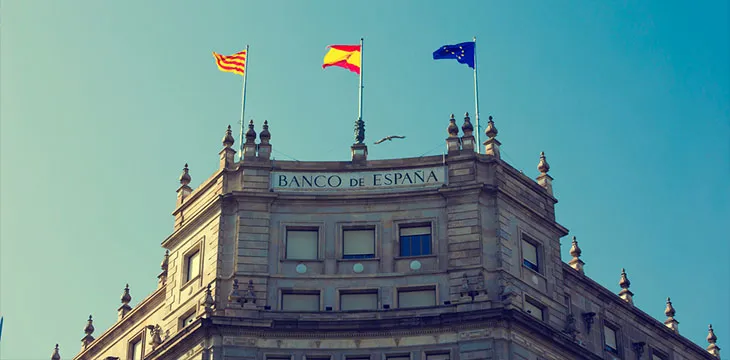|
Getting your Trinity Audio player ready...
|
The Bank of Spain has authorized fintech firm Monei to issue EURM tokens linked to the euro as part of its financial sandbox, reports Cinco Dias.
Monei’s pilot is scheduled to run anywhere between six to 12 months, according to the news outlet. It forms part of an experimental sandbox designed to test new financial products. Monei’s pilot will be open to a limited number of participants in Spain, aiming to become the “embryo of the digital euro” designed by the European Central Bank (ECB).
Participants in the pilot can access EURM tokens by providing their phone numbers and completing a video verification process. Monei’s wallet is funded with assets held at Banco Bilbao Viscaya Argentaria (BBVA) and CaixaBank, with the utility of sending “from hundreds of euros to fractions of cents.”
Other functionalities in the pilot project include the ability for businesses to schedule daily payments to their customers while employees can decide their preference for payroll collection. Furthermore, Monei says that its pilot is programmed to detect an increase in account balance to sufficient levels to make payments.
“The future of payments is digital. This is our opportunity to show the rest of Europe and the world that we are at the forefront,” Monei CEO Alex Saiz Verdaguer said.
The Bank of Spain clarified that Monei’s experiment has “nothing to do with the digital euro.” The banking regulator added that “it is neither a prototype nor a pilot test for the digital euro,” but some participants opine that there could be a convergence in the future.
“The result of the Monei tests will have no relationship or any repercussions on the development of the digital euro that the ECB is studying,” said the bank.
Spain is forging ahead without the ECB
While the ECB is dithering in its desire to launch a digital euro, Spain’s central bank has disclosed plans to start testing its wholesale central bank digital currency (CBDC). The central bank announced that its moves are also independent of the digital euro and are “exclusive” to Spain.
The disclosure noted that the Bank of Spain would focus on fund transfer among financial institutions while foraying into the uncharted territory of CBDC cross-border payments.
ECB’s plans to issue a digital euro are still in the preliminary stages, with the regional body still in the middle of a two-year investigation into the viability of the CBDC. The ECB has gone on to issue a series of working papers into the design of the digital yuan, but experts believe a full-scale launch should be expected in 2026.
To learn more about central bank digital currencies and some of the design decisions that need to be considered when creating and launching it, read nChain’s CBDC playbook.
Watch: BSV On-chain Ecosystem Development in Europe

 07-03-2025
07-03-2025 





